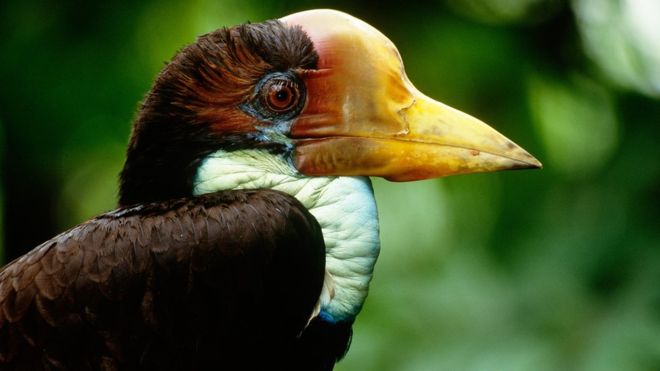An Asian bird species under threat for its ivory like helmet has gained extra protection at the Cites conference in Johannesburg.
Numbers of the helmeted hornbill have plummeted in recent years as demand soared for the so-called “red ivory” that makes up its bill.
Prized in China the hornbill helmets are worth up to five times the price of elephant ivory.
The Cites meeting has now voted for extra efforts to curb illegal trade.
Casques for carving
Known for it’s unusual call that sounds like a cackling laugh, the helmeted hornbill is the largest hornbill species in Asia and is found in tropical forests in Indonesia, Thailand, Malaysia and Myanmar.
The bird has been under pressure for years from the on-going deforestation and development of palm oil plantations.
But it’s the hornbill’s helmet, or casque, that sits on top of its bill that is pushing it to the brink of survival.
Unlike many other species, the casque is made of solid keratin, akin to rhino horn, and has long been valued as a material that’s easy to carve.
But over the past the past six years demand has soared, many conservationists believe, in parallel with the growth in demand for elephant ivory.
“They are quite large birds, the males can reach just over 3kg so they are relatively easy to shoot,” said Sophie Adwick from the Zoological Society of London.
“It’s often said that you can hear them before you can see them as they make a cackling type noise.”
“This ivory can be carved more easily than elephant ivory, because its slightly softer, so it can be used to develop really intricate ornaments which are then sold as status symbols,” said Ms Adwick.
“With increasing wealth across Asia, there is increasing demand, and these birds are being killed and traded at rates their populations probably can’t support.”
The loss of the males through poaching is also having a knock on effect on females, thanks to their unusual breeding behaviours.
The females make their nests in hollowed out trees and the males seal them into the nest using mud.
The females stay there for up to 160 days with the males bringing them food and feeding them through a slit in the mud seal.
When the males are shot for their bills, it’s likely that this also results in the deaths of females and chicks as there’s no one to feed them.
The species is already listed in Appendix I so there is no legal trade – but in an effort to get greater enforcement of protection for this species, Indonesia put forward a resolution and, after some amendments, the Conference of the Parties meeting here has approved a series of decisions that will improve the legal protection of the birds, increase co-operation between law enforcement agencies and encourage public education programmes.
H.Z

